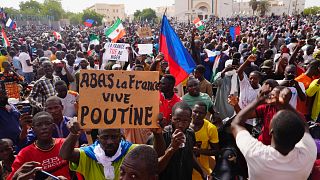Niger
In April this year, students at the University of Khartoum held demonstrations on campus to protest government plans to sell off the university’s historic buildings.
Khartoum University was opened in 1902 and is Sudan’s oldest higher learning institution.
The government said that unnamed armed groups were trying to undermine security at Sudan’s universities – long centres for political activism and debate.
The protests moved to the streets after the killing of a student who was shot by unidentified gunmen.
Activists and rights groups claim dozens of students who were arrested during and after the demonstrations are still being detained without charge.
Zainab Badr Al-Din says she has not seen or heard from her son, Badr Al-Din since early May. They were arrested at their lawyer’s office during legal consultations.
“They arrested them at lawyer Nabil Adib’s office on May 5th. This is the twenty-fifth day. Twenty-five days I’ve not seen them. I have not slept. Twenty-five days. I do not know if my son is alive or dead. When it is your child at the security offices, we expect anything,” she said.
President Omar Hassan al-Bashir, who took power in a 1989 coup, brooks little dissent in Sudan. Bashir is wanted by the Hague-based International Criminal Court on charges of masterminding genocide, crimes against humanity and war crimes during Sudan’s Darfur conflict. He denies wrongdoing.
Nabil Adib, a lawyer and human rights activist is the legal council for some of the students including Zainab’s son.
“We were able to complete the procedures through their (students) families. We saw that they were under arrest and wouldn’t be able to submit an appeal and their right to do so might be lost over time and indeed if we had not submitted the appeal to the vice chancellor of the University their rights would have been lost,” said Adib.
Zainab says she fears for her son’s life. Rights groups allege Sudan’s security forces systematically torture detainees and enjoy immunity from prosecution. An Amnesty International report released in 2010 stated intimidation and threats against detainees or their families were also common.
“I cannot describe to you how I feel. I sleep on a bed with a blanket but Badr al-Din sleeps in refrigerators. They torture them inside these refrigerators. It’s freezing inside,” she said.
Sudan has been suffering from an economic crisis since South Sudan seceded in 2011, costing Khartoum more then 70 percent of its oil revenues.
Reuters













Go to video
ICC warns of a dire humanitarian crisis in Sudan as the war rages on
01:01
Chad’s former Prime Minister appeals to Macron after two months in detention
01:05
Ethiopia's mega-dam on the Nile is "now complete", Prime Minister says
01:49
Sudanese refugees in Chad face deepening humanitarian crisis
01:01
Ecuador recaptures fugitive drug kingpin 'fito' after dramatic raid
Go to video
UN warns of escalating humanitarian catastrophe in Sudan amid ongoing conflict